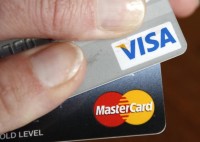It’s one of the fastest growing types of identity theft — and if you don’t know where to look, you won’t see it until after it has taken a big toll on your credit score. It’s called “new account fraud.” A bad guy gets your personal information, such as your Social Security number, and uses it to open a new credit card in your name. Then he goes on a big shopping spree and never pays the bill. Those unpaid bills then end up as black marks on your credit report, even though you may never have even known the card existed.
New account fraud rocketed up 113% in 2015, according to Javelin Strategy and Research’s 2016 Identity Fraud Study, and now accounts for 20% of all fraud losses in the U.S. Javelin attributes this huge jump to a change in strategy by fraudsters as a result of the introduction of EMV chips to credit cards in the U.S. Basically, since the chips made it harder to commit fraud with existing cards, criminals turned their focus to another low-hanging fruit: New account fraud.
Since the bad guys have changed their strategy, you should think about your own, too. Here’s what you should do:
- Check your credit report regularly
This is the key to combatting new account fraud. Fraudulent new accounts opened with your Social Security number should appear on your credit report. Get your free credit report from AnnualCreditReport.com or My.CreditCards.com, and if you see anything unusual, report it immediately.
- Dispose of sensitive information carefully
Don’t just throw away documents with your personal information. Shred them. Cut them to pieces. Make them completely unreadable. Otherwise, you’re potentially giving fraudsters a real gift.
- Beware of online scams
Give out your personal information with care. Restrict your online shopping to established sites that you know and trust. And never, ever click on a link in an email that you sense is suspicious.


